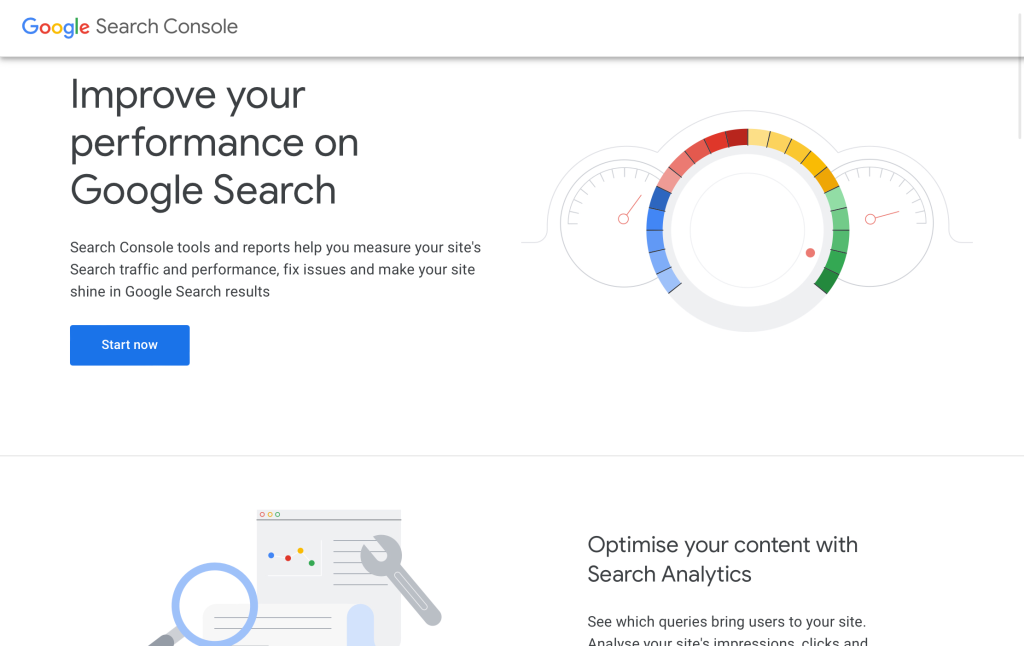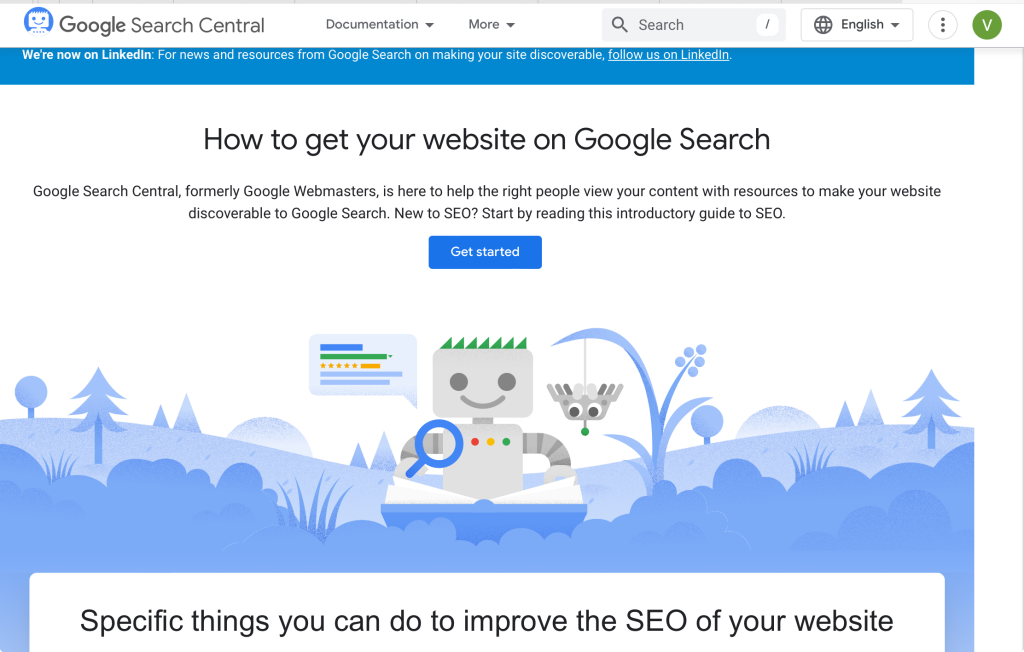
The digital landscape has seen huge transformations over the past decade, and so too have the tools available to website owners and SEO professionals.
This article delves into the history of Google’s search engine platform, and provides 7 tips for implementing Google’s SEO toolkit like top agencies do (or at least have a go). Plus, find out Google’s take on SEO in 2024.
The Evolution of Google’s SEO Toolkit (and my personal experience)
What was once known as Google Webmaster Tools has evolved into a suite of interconnected platforms, all designed to provide comprehensive insights into website performance and overall search engine optimisation (SEO) metrics.

If you’re a newb to all this, here’s a little backstory: Google Webmaster Tools, as it was originally known, was a foundational (all-in-one) platform for understanding website health and search engine visibility.
I used it from around 2008, and it was fairly straightforward and intuitive – pie charts, etc. Easy. As a newb myself back then and keen to learn, I dived straight in, and found it really useful for gaining insight for my first web design projects.
Google rang my Client (he was well-chuffed)
I could see at a glance where traffic came from, and when Google rang my client to verify business ownership and he hit top spot in the search engine results, I think I was more chuffed than he was at seeing the mighty (SEO) beast in action, real-world and online.
He stacked up plenty of great reviews from his commitment to launching a hotel and restaurant, and cooking some of the finest seafood in Angus. But he also embraced the changing technologies that helped put him on the Google map, literally.
What’s inside Google’s SEO Toolkit?
However, as Google’s algorithms and search landscape grew increasingly complex, the need for more specialised tools became apparent. In response, Google introduced several new platforms, each with a distinct focus:
- Google Search Console: This platform replaced Google Webmaster Tools, offering a more comprehensive suite of tools for monitoring website performance, identifying issues, and optimising for search engines with a comprehensive list of issues and recommended improvements.

- Google Analytics: Providing in-depth insights into website traffic, user behaviour, and conversions, Google Analytics has become an indispensable tool for understanding audience demographics and preference.
- Google PageSpeed Insights: This tool analyses website performance and provides recommendations for improving load speed, plus indexing SEO performance within page speed, accessibility, etc.
While these platforms are distinct (and can be daunting to look at to start with), they are interconnected, providing a holistic view of website performance.
Bonus: Free Google Kit Plugin for Websites
There are also plugins like the Google Kit available to install on compatible websites. You can see all the data from everything in the toolkit straight from the website admin dashboard.
How The SEO Toolkit Works Together and for You
Google Kit works with CMS sites, like ones running on WordPress, plus plenty more. But be careful with ready-made sites, there might be (hidden) extra costs inherent.
What Free SEO Data and Tools are Available for Everyone?
Anyone can access and learn from Google’s Toolkit and SEO data. For example, data from PageSpeed Insights can be correlated with search rankings in Search Console, helping to identify opportunities for improvements, like fixing image issues that cause site load delays, or SEO improvements like adding missing meta descriptions.
There’s more, but hopefully you get the idea – it’s an extremely useful SEO toolkit.
DIY SEO vs. SEO Agencies: A Level Playing Field?
The question of whether individuals and small businesses can achieve SEO success without the help of an agency is a common one. While SEO agencies undoubtedly possess expertise and resources, many of the tools and information necessary for effective SEO are freely available.
Put the hours in and learn (and stick at it)
By dedicating time and effort, individuals and small businesses can effectively utilise Google Search Console, Analytics and PageSpeed Insights to improve their website’s performance.
DIYers can Access the Same SEO Tools as SEO agencies (for free)
However, SEO is an ongoing process that requires continuous monitoring and adjustments – you’ve got to stick at it and keep making improvements, especially when updates around Search are released and you need to adapt your strategy. A few hours each week should be sufficient.

And if you’re feeling brave and like learning and embracing new technologies, Google Search Central, the old Webmasters hub, is full of documentation about all things SEO – the facts straight from the source.
While both DIYers and SEO agencies have access to the same free tools, the difference often lies in the depth of analysis, the ability to interpret data, and the capacity to execute a comprehensive SEO strategy.
Why SEO Agencies have an Edge
Agencies typically have teams of specialists dedicated to staying up-to-date with algorithm changes, the latest technology and software, and follow industry best practices. Whereas, a DIY approach means it might just be you (and it’s a bit overwhelming and you’d like a magic ‘fix it’ button).
Either way, you need to know how to use them to the best of their capabilities with your growing ability to learn (and you will).
You can Become an SEO Pro

Besides pluggjng away and learning more SEO tools and tricks, there are plenty of experts publishing the latest trends and updates for free on various blogs (Google: SEO latest Google search updates).
Plus, here you’ll find blog posts and helpful guides and tips like this, covering the core changes around Search and industry trends, so call back here when you’re next running your site’s health and ready to publish new content – don’t forget to check out our shop, you can grab SEO-friendly articles straight off the shelves and keep Google and your readers happy!
Truth is, nobody, not even the best, understand it all – we’re not supposed to!
Google keeps a lot of things secret so it can’t be manipulated like it used to be. And if you like information and stats, you can become a pro at SEO in no time, if you’ve got time.
7 TIPS for Implementing and Using SEO Tools
Note: While these tools provide invaluable data, success in SEO also depends on understanding user behaviour, industry trends and competitor analysis.
To effectively use Google’s SEO toolkit, follow these tips:
- Set Clear Goals: Define your website’s objectives, whether it’s increasing traffic, generating leads, or boosting sales (maybe all!).
- Regularly Check Search Console: Monitor website health, identify indexing issues, and track keyword performance.
- Analyse Website Traffic: Use Google Analytics to understand your audience, track conversions, and identify top-performing pages.
- Improve Website Speed: Use PageSpeed Insights to identify performance bottlenecks and implement recommendations.
- Mobile Optimisation: Ensure your website is mobile-friendly and provides a seamless user experience.
- Content Creation: Create high-quality, relevant, and engaging content that targets your target audience.
- Link Building: Focus on building natural and authoritative backlinks to improve your website’s authority.
What’s Google’s angle on SEO in 2024?
Today, Google Search Console is its flagship platform. Gary Illyes, Webmaster Trends Analyst at Google, has emphasised the importance of focusing on creating high-quality content that meets users’ needs:
“We want to reward sites that provide great user experiences”
This focus on user experience aligns with the overall direction of Google’s search algorithms, and that content still reigns supreme a decade later, maybe more so with a more user-centric approach.
The verdict on DIY SEO vs SEO Agency?
While the free tools offered by Google are invaluable, some SEO agencies and larger businesses may opt for paid premium versions or additional software to gain a competitive edge. These paid tools often offer advanced features such as in-depth competitor analysis, rank tracking, and more granular data.
However, it’s essential to remember that while paid tools can provide additional insights, the foundation of successful SEO remains strong content, technical optimisation, and user experience. We’ve created content for various SEO agencies, check out our portfolio clips.
Final Word:
By effectively utilising the free tools available, businesses of all sizes can achieve significant improvements in search visibility, and passionate individuals who don’t like being bamboozled by fancy agency talk can too.